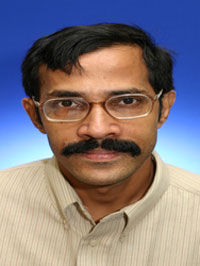
Professor Sridharan’s research interests span the following areas: hardware-efficient algorithms for robotics, multi-robot systems and digital design in emerging nanotechnologies.
In the context of hardware-efficient algorithms, Sridharan and his research group have developed CORDIC-based designs and FPGA implementations for mobile robot navigation and mapping. An FPGA-based mobile robot has also been fabricated in-house and extensive experiments have been performed. Recently, a CORDIC-based scheme has been proposed for convolutions in deep networks.
In the domain of multi-robot systems, Sridharan and his research group have investigated rendezvous of mobile robots amidst obstacles and distance constraints using tools from computational geometry. An extension to rendezvous of a pair ofrobots amidst a powerful adversary has also been studied in a geometric setting.
Work in the area of digital design has focussed on study of (i) majority logic for quantum dot cellular automata (QCA) and (ii) ternary logic for carbon nanotube FETs (CNTFETs). New results on majority logic have been obtained with reference to arithmetic circuit design in QCA. Further, specific unary operators of ternary logic have been studied to obtain high performance SRAM designs in CNTFET technology.

